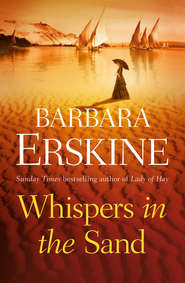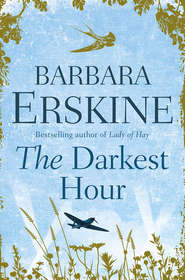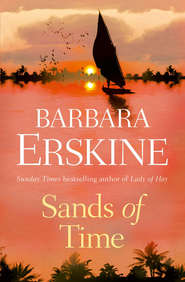По всем вопросам обращайтесь на: info@litportal.ru
(©) 2003-2024.
✖
The Ghost Tree: Gripping historical fiction from the Sunday Times Bestseller
Автор
Год написания книги
2019
Настройки чтения
Размер шрифта
Высота строк
Поля
‘You really believe that will work?’
‘It will work,’ she said emphatically. ‘And that would at least give us half the house and half the stuff.’
‘Us? It will give me half the house,’ he said mildly. He gave a grim smile. ‘After all, it will prove you are not my sister.’
He looked away when he saw the ice-cold fury in her eyes. ‘Don’t even think you’re going to cut me out of my share,’ she said quietly. ‘It was all my idea and my planning. You haven’t the brains to tie your own shoelaces!’ The scorn in her voice was cutting.
He gave a small shrug of his shoulders. ‘It was me that sat with that old man for months.’
‘And why not? It’s not as if you had any other job.’ She stood up. ‘Now, what do we do with the silver and stuff?’
‘We’re going to deny having it, right?’
‘Of course.’ The tone was withering again. ‘They can prove nothing if they can’t find it.’ She put her hands on the table in front of him and leaned forward, right in his face. ‘What did you do with that box of muck?’
It was the first time she had asked. ‘I put it in the rubbish skip down the road, like you said.’ He didn’t meet her eye.
‘Good. Right. Now, we have to get everything out of here. We can smash up the pictures and burn them; they aren’t worth anything. The rest is easier to stash.’
‘I know where we can hide the stuff.’ His voice was quietly triumphant. ‘Somewhere they will never even think to look.’ Her casual dismissal of the pictures hurt. They were old and so probably valuable.
‘Where?’
‘Macdermott’s place in Cramond.’ He grinned.
She opened her mouth to protest, then sat down opposite him and stared at him hard. ‘Go on.’
‘When I was poking about there in the garden I came across an old shed behind the outbuildings. Looks as though no one has been in there for years. It’s full of spiderwebs and dead leaves. I can put it there.’
She thought for a moment. ‘It could work.’
‘Can you think of anywhere better? Short of chucking it in the Forth?’ His courage was coming back. ‘And you can’t exactly have a bonfire here, can you! Mr Nosy next door would want to know what you were doing and there would be forensic evidence, even if it was ashes.’
‘No, you’re right.’ She made up her mind. ‘Let’s load the car.’
‘I can’t do it in daylight.’
She hesitated. ‘We’ve got to risk it; we can’t risk keeping the stuff here in case the police come. We were stupid to use this address on the will, but we had to give them somewhere to contact us.’ She scowled. ‘Load the car then park it somewhere until it’s dark.’
Once her mind was made up, they were a team again.
The family visit had not gone as well as Tom had envisaged. The Tartar, having cruised north to Pensacola, turned to patrol southwards again and finally arrived in Jamaica, anchoring off Kingston. Leaving the ship, his chest carried ashore by one of the sailors and passed on to one of his cousin’s slaves, it was with some relief that he turned his back on the sea for a while.
If he had expected a hero’s welcome from his father’s cousin, he was sadly disappointed. She turned out to be an elderly lady, comfortable in her own world, with little interest in a fourteen-year-old boy. It was a huge relief to both of them when she announced that they were expecting a visitor. ‘Dr Butt,’ she told him. ‘I think he will be better suited to entertaining you, Thomas. I fear I have no conversation for a boy your age.’ She smiled that cold austere smile that he had so quickly grown to dislike. He had hoped to find the warmth and welcome here that the word family conjured in his mind. Her next sentence was like a slap in the face. ‘He can fill in the time by teaching you till you go back to your ship.’
Dr Butt, however, turned out to be an agreeable and affable man, recently appointed to the position of physician general to the island militia, who swept the lonely boy under his wing and took him back to his own house where Tom spent a most enjoyable time, studying, drawing, exploring the island and flirting with Dr Butt’s daughters, who helped him choose a tortoise to ship home as a gift for his mama in Bath.
It was to Dr Butt that he finally confided the story of his illness. The doctor examined the medicine the slave woman had given him and he nodded, sniffing the mixture and examining the faint scars left on Tom’s body. ‘Yaws,’ he said. ‘Horrible, but not fatal. It is incredible how clever some of these African women are. Obeah women, they call themselves. They practise the magic of their own religion. Some are genuine healers with far more knowledge than many of us so-called educated doctors.’ He smiled. ‘We could learn so much from them if we only let ourselves listen.’
Tom did not mention the strange doll the woman had given him, sensing the doctor would not be so approving of that. It was tucked in the bottom of his trunk, wrapped in a neckerchief. He could feel its power, but it didn’t frighten him; on the contrary, he knew it would somehow keep his belongings safer than any padlock.
It was with genuine regret that he prepared for his recall to the ship. Having packed his trunk and dispatched his last batch of letters home, he headed back to the harbour, hoping against hope that he would not find Andrew Farquhar waiting for him.
20 (#ulink_56b610a8-cdad-55e7-a37f-15a43f933e3c)
Timothy pulled the car under the trees where he had parked before, reached over to the passenger seat for his backpack and the large torch he had bought that afternoon, and let himself out into the cold night.
The air was heavy with moisture, a damp mist hanging low over the garden as he tiptoed across the grass at the side of the driveway. There were no cars parked outside the house and there was no sign of life. Perhaps there was no one at home.
On the face of it, this was a brilliant plan and he had sold it to April easily, but there were one or two snags he hadn’t mentioned, the first and most obvious being that he had not actually looked inside the shed. He didn’t know what sort of condition it was in and he had to find a way of freeing the door from its curtain of ivy and bindweed in such a way that there would be no trace of him afterwards. In his sack there were kitchen scissors and a large knife and some secateurs. He was pretty sure he could hack his way into the shed with those, but what to do to put it all back and restore it to its desolate appearance of never having been touched in fifty years was a problem he would have to solve when he got to it.
As his eyes grew used to the misty darkness he could see thin lines of light around the curtains drawn across the French doors at the back of the house out of which Ruth and Macdermott had appeared last time he had been here. He had no way of knowing Ruth was even still there, but it was she he pictured in the house. He waited for several seconds. The darkness made him feel safe. Even if she opened the doors and came out onto the lawn, she would not see him. He backed away. She wouldn’t be able to see the outbuildings from there anyway, screened as they were by a line of trees and shrubs. She could walk all the way down to the river, as she had done that evening with Macdermott, and she still wouldn’t see him.
The jungle area behind the garage looked even more wild and impenetrable in the cold beam of the torch. He surveyed it carefully. In daylight he had been able to see the shadow of the door behind the ivy. Now it was all black moving shapes and crawling stems. There was a sudden disturbance among the leaves and a blackbird shot out of its roost with a deafening shriek of alarm. He jumped back, his heart thudding with fright. Turning off the torch he waited, expecting to see lights coming from the direction of the house, expecting shouts and police sirens. There was nothing. The darkness fell back into silence.
It was a couple of minutes before he dared turn on the torch again.
The biggest mistake he had made, he realised very quickly, was not to bring gloves. He gave a grim smile. Obviously he wasn’t a seasoned crook or hiding his fingerprints would have been the first thing he thought of. And since he wasn’t a seasoned gardener either, it hadn’t occurred to him that nature would fight back, that the undergrowth would tear at his skin and be full of thorns.
He managed it in the end, freeing the door of everything but cobwebs, the rusty latch hanging off, the padlock that had once secured it dangling uselessly from its hasp. He gritted his teeth and pulled. The door didn’t move. He pulled again, careless of the blood dripping from his fingers and from the deep scratch across the back of his hand. He was sweating from his exertions, the cold seeping into his body now he had stopped, and he was exhausted. When the door resisted, he wanted to sit down and cry. He gripped the edge of the rotten boards once again dragging at it with the last of his strength and reluctantly it began to move. He pulled one more time and with a deafening squeak and groan of rusty hinges it opened. He was past caring if anyone had heard as at last he shone his torch inside.
The shed was a lean-to, mostly empty. In the far corner was an ancient mower, draped in rotting tarpaulin; there were broken rakes and spades leaning against the wall and a pile of ancient flower pots. The ground was beaten earth. He shone the torch upwards and saw the underside of the roof, some of it tiles, some rusty metal, all precariously balanced on split and sagging beams. It looked as if the slightest breath of wind would bring it down.
He bit his lip. It would do as a temporary hiding place but not for long. It was not secure and it was far from weatherproof. If the paintings were left in here for more than a few days they would be destroyed. He cursed again. He should have thought of bringing something waterproof to drape over everything. He shivered. He could not change his mind now. There was no plan B. His only option was to cart the stuff from the car, stack it in here, behind the mower, refasten the door and drape the ivy back into place as best he could. Once he was safely home in the warm and dry he could try and think of somewhere better to hide the stuff. He glanced towards the house. It was all in darkness. They must have gone to bed. He was amazed at the shot of jealousy and disgust that knifed through him at the thought of Ruth and that fat slob together.
Ruth was eating a bowl of breakfast muesli the following morning when there was a knock at the kitchen door. She froze, her spoon halfway to her mouth.
Slipping off the stool, she opened the door to a tall, lanky man with fiery red hair and bright blue eyes. ‘I’m Lachy.’ He held out his hand.
‘Lachy?’ She shook it, bewildered.
‘Did Finlay not mention I’d be coming to tidy the garden?’
He accepted a cup of coffee, and stood leaning on the sink as he sipped from it. ‘Have you heard from Finlay?’
‘No. I was going to text him to see if he had arrived safely.’
‘He’s not very good at keeping in touch when he’s on one of his research trips.’
She laughed. ‘You obviously know him very well.’
‘We go back a long way. I come in from time to time to keep an eye on things here. If I didn’t, Finlay would be lost in the jungle by now. The man doesn’t understand that things grow and when you cut them down they grow again.’ He laughed.
‘Isn’t that odd. You would think as a cook he would have a fantastic kitchen garden. There’s plenty of room here.’
He blew the steam off his coffee and took a sip. ‘Gardening needs to be a passion to keep on top of something like that. He hasn’t the time. And he knows someone who grows wonderful organic veggies for him.’
‘You?’











